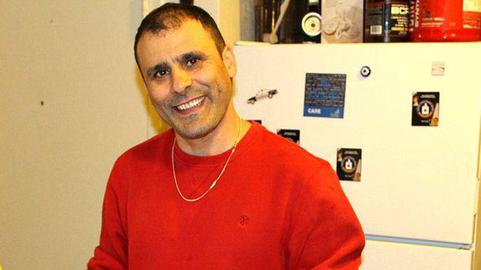Reza “Robin” Shahini, the Iranian-American dual national arrested in July, has been sentenced to 18 years in prison. Shahini himself announced the news on October 24 during an interview with VICE News. The interview was conducted via telephone from inside the prison.
Reza Shahini has been a US resident for the past 16 years. During this time, he has visited Iran several times. At the time of his arrest, he was visiting his mother in the northeastern city of Gorgan, the provincial capital of Golestan, when Revolutionary Guards Intelligence Unit agents arrested him as he was on his way to a restaurant with friends.
“It was a terrifying moment, and they blindfolded me and they took me to custody and I did not know where I was,” Shahini told VICE News. “They were interrogating me every morning, every afternoon, and I was always by myself in my cell.”
As Associated Press reported, the sentence is “the harshest yet” handed down to a dual national detained in Iran. The report said that analysts believed Shahini could be used as a bargaining chip in future negotiations with the United States. In an interview with IranWire, Shahini’s sister Fatemah said the sentence against her brother had no legal merit and the charges against him were “absolutely false.” She added that she had been allowed to speak to her brother on the phone.
“He went there to visit our family and had no idea that he might get arrested,” Fatemah Shahini told IranWire, though she admitted that she had felt nervous for him. “He was enjoying it so much; wherever he went, he posted pictures...and wrote about Iran’s natural beauty,” she said.
After Shahini’s arrest, an Iranian website quoted Revolutionary Guards stationed in the state of Golestan, saying that Shahini had been under surveillance since his arrival and that he had been arrested on a number of charges, including cooperating with the US government, threatening national security and ties with counter-revolutionary elements.
According to Shahini himself, the judge in his case used photographs and posts from his Facebook page as evidence to prove he had been part of the so-called “sedition” that followed the disputed 2009 presidential election — in other words, the judge built a case that said Shahini took part in the mass protests that received huge media attention across the globe.
“In 2009, right in the middle of the political crisis of that year, Reza went to Iran to visit our family,” Fatemah Shahini said. “It was very fascinating for him that the young people were very active, that there was both joy and an environment for expressing their views. He would call me and tell me: ‘This is really a democratic and free country. People are free to act and express their opinions.’ But suddenly these peaceful events ended up in violence. He was shocked and horrified. His last few days in Iran were the days of arrests.”
Up to now, the family had not spoken out about Shahini’s detention. “Our family in Iran were told it would be in their interest if they did not talk,” said Fatemah Shahini. “For 12 days, my family had no news of him. After 12 days of intense worrying, we learned that he was in solitary [confinement]. He was in solitary and under interrogation for 20 days and then he was transferred to the [communal] ward.” She added that her brother had said conditions in prison outside of solitary confinement were relatively good. “At Gorgan prison they had even given him his own room and some of his personal belongings were transferred to him from home.”
She said she could not believe what had happened, and that the entire family was stunned. “My family really believed them, respected their words and said nothing so that things would not get more complicated. They showed respect to the Islamic Republic’s demands and in no way expected that an innocent person would get 18 years in prison. My family believed that he was 100 percent innocent and they had no doubt that he would be quickly released. My brother himself was hoping that he would be released soon and could return [to the United States]. He had to come back to register for his new semester for his Master’s degree.”
Shahini, aged 46, completed an undergraduate degree in international security and conflict resolution at San Diego State University in California. He has often used his Facebook page and his blog to express his own views and analyses of international events.
After news of his arrest emerged, websites with links to Iran’s hardliners posted photographs taken from his Facebook page and referred to him as counter-revolutionary, a spy and a cohort of anti-Islamic Republic media. “Western and US intelligence services especially count on their dual national agents,” one website read.
Shahini told Vice News that he was planning to go on hunger strike to protest against his imprisonment.
Could A Family Member be to Blame?
Some Iranian media reports have featured photographs of Shahini with Sayyed Abolhassan Banisadr, the first president after Iran’s 1979 Islamic Revolution, who was forced into exile after he was impeached in 1981, and with Reza Pahlavi. But Fatemah Shahini denies that her brother is in any way politically inclined. “My brother has no specific political leanings. He was neither a monarchist nor a dissenter. He is a knowledgeable and open-minded person who took pictures during chance meetings with these people. As far I know he met [the dissident journalist] Akbar Ganji by chance and after they were introduced he took a picture with him. He was a curious person and because he had witnessed the events during the [2009] election, he took pictures with these people.”
When asked why authorities waited two months to arrest her brother, Fatemah Shahini explained that a family matter might be to blame, albeit indirectly. “My niece and her husband are separated. My brother, who does not approve of violence, said he could not understand the reason for their violent marriage. After this, the husband formed a grudge against my brother and witnesses say that he sent a letter saying that Reza was a counter-revolutionary. They say that his brother-in-law is an influential person in the government.”
The Third Sentence of its Kind
This is the third long prison sentence to be handed down to Iranian-Americans in the last two weeks. On October 18, authorities sentenced Siamak Namazi and his father Baquer Namazi to 10 years in prison each. Siamak Namazi is the head of strategic planning at Crescent Petroleum, which has its headquarters in the United Arab Emirates. His 80-year old father, Baquer Namazi, was arrested on February 22, 2016, when he arrived in Iran to visit his imprisoned son. Apart from the vague accusation of cooperating with “hostile” governments, no specifics charges against them have been announced. Both were denied access to a lawyer.
According to his sister, Reza Shahini’s lawyer, Haj Ramezan Mashhadi, promised not to talk to the media. “Altogether he was not a tough lawyer, and did not talk about the situation of my brother,” she said when asked about courtroom proceedings. She confirmed the lawyer had not been appointed by the court, an increasingly common situation for dual nationals or others held on espionage or national security-related charges in Iran.
Following the nuclear agreement in 2015, four Iranian-Americans — Jason Rezaian, Amir Hekmati, Saeed Abedini and Nasrollah Khosravi — were released as part of a prisoner exchange in January 2016.
Over the last few months, the United States State Department has repeatedly warned its citizens against traveling to Iran. On August 22 2016, it issued its third warning this year, and advised that it cannot provide protection or routine consular services to US citizens in Iran. “Iranian authorities continue to unjustly detain and imprison US citizens, particularly Iranian-Americans, including students, journalists, business travelers, and academics, on charges including espionage and posing a threat to national security,” said the travel advisory.
There are Others, Too
But Iranian-Americans are not the only dual nationals who face arrest in Iran. In August, the Revolutionary Court sentenced Nazanin Zaghari-Ratcliffe, a charity worker with dual Iranian-British citizenship, to five years in prison. Like Shahini, she had traveled to Iran to visit her family. “Nazanin had been to Iran many times to visit her family and had never had any problems,” her husband Richard Ratcliffe told IranWire. “She has never been afraid to travel to Iran and her family has never had any trouble. They are quiet people.” But on April 3, when she was about to leave Iran, the Revolutionary Guards arrested her and sent her to prison in southeastern city of Kerman, about 1,000 kilometers away from Tehran. The Iranian judiciary prevented her two-year old daughter Gabriella from leaving Iran, although the child is a British citizen, not a dual national. The Revolutionary Guards claimed Zaghari-Ratcliffe had been arrested in connection with events following the 2009 presidential election. Her husband, Richard Ratcliffe, says his wife and their daughter have been taken hostage.
British-Iranian citizen Kamal Foroughi, aged 77, was arrested on May 5, 2011, and is serving a seven-year sentence on espionage charges.
On October 24, Ratcliffe and Kamran Foroughi, Kamal Foroughi’s son presented a letter to the UK’s Foreign and Commonwealth Office, calling for Foreign Secretary Boris Johnson to seek the immediate release of their family members, and for the release of another British-Iranian citizen, Roya Nobakht.
Homa Hoodfar, a retired Iranian-Canadian anthropology professor, was arrested in June. Hoodfar went to Iran in February for personal reasons, but she conducted historical research on the role of women in Iranian society while she was in the country. On September 26, the Iranian Foreign Ministry announced that she had been freed on “humanitarian grounds” including the need for medical treatment. She returned to Canada via Oman.
“The Government of Canada has been actively and constructively engaged at the highest levels in Dr. Hoodfar’s case – since her ordeal began – working for her release and return to Canada,” said Canadian Prime Minister Justin Trudeau after her release.
It appears that Hoodfar might have been released because Canada and Iran are actively working to resume diplomatic relations between the two countries. But, hopes for improved relations between Iran and the United States are less straightforward. However, family members and those working to free Shahini and other dual nationals will undoubtedly continue their efforts, hoping diplomatic resolutions will produce a similar outcome.
“My brother is very sociable, honest and kind,” said Fatemah Shahini. “How is it possible? What is their understanding of human beings and their lives?...How can they sentence a person to 18 years in prison when he is not in any sense political? Their negative imagination is so powerful that they can bring such serious charges against a person based on a few pictures and videos. I would like to tell the judge to look into his heart.”
With additional reporting by Shima Shahrabi
visit the accountability section
In this section of Iran Wire, you can contact the officials and launch your campaign for various problems

























comments
Perhaps this might interest you.
https://www.pedziran.com/english/hard-hearted-political-islam/